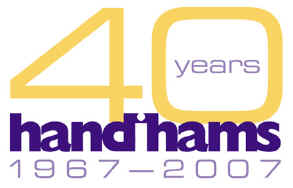 In this issue you will find:
In this issue you will find:
- Slow News Day
- Will Morse code survive in the marketplace of amateur radio modes?
- Avery tackles 40th anniversary ideas
- In AT: The AT Boogie
- Elmer answers another upgrade question
- In RekkyTec: Windows Vista upgrade page
It's a slow news day.

Pictured L-R: Dennis, N0CCR, Nurse Kathy, Matt, KA0PQW, and "Cruise Director" Colleen. Kathy & Colleen both have guitars, but this picture is all "show business" - there is really no music going out on the air over Matt's HT during radio camp! Photo credit: K9HI
We are back from California Radio Camp, full of new and exciting ideas about the Handiham Radio Club and the upcoming Minnesota Radio Camp, which will happen in late August. While we were at camp, something really big happened; Morse code testing went away here in the United States, as it had already done in many countries around the world following WRC-03. In 2003, the international requirement for Morse code testing was dropped, initiating the slow but steady change in examination requirements. Here is an interesting question for you: What jurisdictions around the world still require Morse code testing for their amateur radio licenses? This is not a trick question -- I really don't know the answer and would like to find out.
I have been reading about the impending changes in the Morse requirement for years, of course, just as many of you have. The Morse code debate has been heated at times, with many opinions that seemed to come from every different direction. With the testing question now settled, it seems to me that Morse code can now be learned for fun and to gain that all-important proficiency in CW for serious DX work. What I would like to suggest is that Morse code proponents offer classes through their local radio clubs to make sure this really happens. It would be a shame if someone who wanted to learn the code simply didn't have the resources through their local club.
All of this reminds me of a situation we had at our headquarters office years ago. As I recall, it was prior to WRC-2003 and there was still plenty of discussion about the value of Morse code in the overall scope of amateur radio licensing. Our Education Coordinator had been hearing quite a lot from vocal proponents of Morse code and invited them to offer a class. Believe it or not, absolutely no one would step forward. It seemed like all of that huffing and puffing about Morse code was just hot air and no one could be bothered actually doing the work to share the Morse code with others in a local course.
Is that situation still the same today? Well, I don't think so. My local radio club, the Stillwater Amateur Radio Association, recently offered both a beginner code course and speed-building. Such local courses will determine whether Morse code survives in the marketplace of amateur radio modes. In fact, amateur radio modes of operation really are much like a marketplace. Some are popular and have real staying power, such as FM repeater operation and single sideband HF operation. Others seem to be popular for a short time, gaining widespread use and then falling back considerably in popularity. Packet radio seems to fall into that category. Although Morse code has been popular for many decades, one could say that it has had an unfair "subsidy" in the amateur radio mode marketplace because it was a required testing element. It will be interesting to see whether or not it can hold its own on the now-level playing field with other modes of operation.
Patrick Tice, WA0TDA